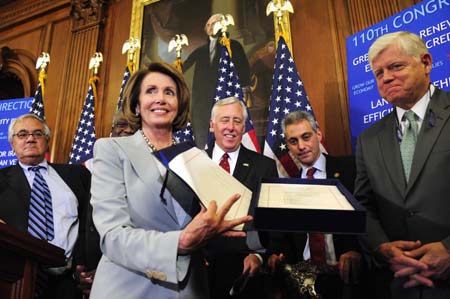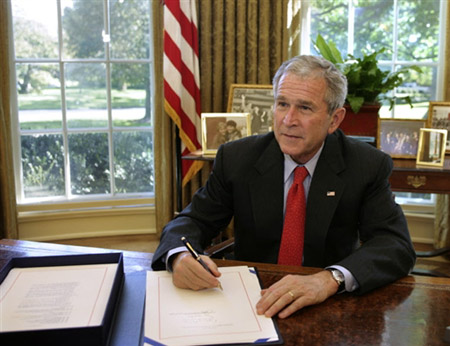The U.S. House of Representatives on Friday approved a revised 700 billion dollars bailout plan, authorizing the government the largest financial intervention since the Great Depression, and President George W. Bush immediately signed the plan into law on the same day.
 House passes bailout, Bush signs
House passes bailout, Bush signs
|

|
|
U.S. House of Representatives Speaker Nancy Pelosi (front L) presents the financial rescue package bill she just signed in Washington, Oct. 3, 2008. [Xinhua]
|
The financial bailout package was passed by a vote of 263-171, a comfortable margin that was 58 more votes than the measure garnered in Monday's stunning defeat.
Monday's vote sent markets plunging around the globe and forced the Bush Administration and congressional leadership to scramble and salvage the rescue plan. The Senate passed the new version Wednesday on a bipartisan vote of 74-25.
President Bush signed the measure at his desk in the White House after returning from the nearby Treasury Department where he thanked employees for their hard work on the rescue package, U.S. media reported.
Bush also praised the Congress's efforts, saying the passage represented "decisive action to ease the credit crunch that is now threatening our economy."
"A short time ago, the House of Representatives passed a bill that is essential to helping America's economy weather the financial crisis," Bush said.
"We have acted boldly to help prevent the crisis on Wall Street from becoming -- from becoming a crisis in communities across our country," said the president. "We have shown the world that the United States of America will stabilize our financial markets and maintain a leading role in the global economy."
Meanwhile, Federal Reserve chairman Ben Bernanke stressed that the 700 billion dollar bailout plan was "a critical step" in stabilizing markets and restoring credit flows.
The Fed "will continue to work closely with the Treasury as it undertakes these new initiatives" and would "continue to use all of the powers at our disposal to mitigate credit market disruptions and to foster a strong, vibrant economy," he said.
Treasury Secretary Henry Paulson also pledged that he will take quick action to get the 700 billion dollar rescue bill up and operating.
"This was obviously a very important vote. It was a vote to protect the American people ... and their jobs," Paulson said.
Under the rescue bill, the federal government will be authorized to purchase these assets from banks and other financialinstitutions, which is expected to help enable them to resume lending to businesses and consumers.
The new version approved by the Congress will raise federal deposit insurance limits to 250,000 dollars from 100,000 dollars per account, as suggested by the two White House hopefuls days ago.
Another big change is the introduction of a 10-year, 150.5 billion package of tax proposals, including measures to ease the bit of the so-called alternative minimum tax and R&D tax credits coveted by high-tech companies and drug makers.
 |
|
U.S. President George W. Bush on Friday signs the historic financial bailout plan into law, which authorizes the government the largest financial intervention since the Great Depression.
|
The changes in the bill were quantifiable, the initial proposal from the Treasury Department ran three pages, while the latest version exceeds 450.
Supporters said the bailout was needed to prevent economic collapse; opponents said it was hasty, ill-conceived and risked too much taxpayer money to help Wall Street tycoons, while providing no guarantees of success.
In the Senate, lawmakers who opposed the plan on Wednesday warned that it still did not address the root problems in the American financial system, including lax regulation.
However, as the shape of the new bill became clearer on Wednesday, some lawmakers in the House indicated that they might change their minds.
"No matter what we do or what we pass, there are still tough times out there. People are mad -- I'm mad," said Republican Representative J. Gresham Barrett before the vote, who opposed the bill on Monday.
"We have to act. We have to act now," he noted.
"I have decided that the cost of doing nothing is greater than the cost of doing something," said Representative John Lewis, another convert.
The Bush Administration and key lawmakers have warned repeatedly that economic crisis will become a full-fledged disaster if Congress rejects the rescue plan.
Credit-market turmoil is hitting local governments. U.S. states and municipalities have managed to sell about 700 million dollars of tax-exempt bonds this week, less than 15 percent of a typical week's new fixed-rate issues.
California Governor Arnold Schwarzenegger wrote Paulson Thursday night, saying that his and other states may need emergency federal loans to maintain government operations.
"This credit crisis has the power to grind the U.S. economy to a halt," Schwarzenegger wrote in a letter e-mailed to Paulson.
The House Speaker Nancy Pelosi, a Democrat, urged her colleagues to approve the bill, saying the bill was needed to "begin to shape the financial stability of our country and the economic security of our people."
"If the financial markets fail to function, American families will face great difficulty in getting loans to purchase a home, buy a family car or finance a child's education," the White House said in a written statement released Friday morning.
"We're in the midst of a recession. It's going to a rough ride, but it's going to be a whole lot rougher ride if we don't pass this bill today," warned House Minority Leader John Boehner before the vote.
But some Republican lawmakers still opposed the measure Friday. "If Congress bails out some firms and sectors, how can it say no to others?" asked Representative Jeb Hensarling.
(Xinhua News Agency October 4, 2008)